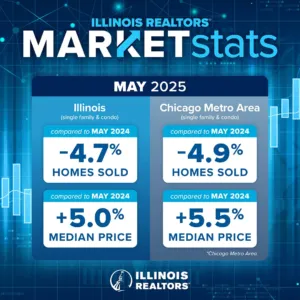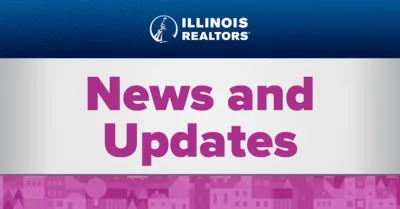Buyer Brokerage: That Was Then; This is now; Here We Go…
(A Recap of Concepts Presented at Illinois REALTORS® Business Issues Forum 2024)
We have all seen the Headlines:
Let’s consider a few different scenarios to help brokers practice their profession and get paid for their hard work.
That Was Then – Buyer Client with no written Buyer Brokerage Agreement
Imagine a scenario where we have a buyer broker who represents a buyer in a non-exclusive brokerage relationship between the buyer broker and the buyer client. The buyer client has received the written Notice of Designated Agency saying that the buyer broker is the buyer’s legal agent. There is no written buyer brokerage agreement of any kind between the buyer and the buyer’s brokerage.
- Buyer broker shows this buyer 7 homes.
- The buyer client finds the perfect one and looks at the home 3 more times with their agent.
- The buyer broker misses a call from the buyer client, so the buyer client calls the listing agent directly and writes an offer through the listing office (the listing agent gives proper Notice of No Agency to the buyer after trying to get the buyer to call their own agent). The offer is accepted.
- The buyer is now under contract, but there is a lot more to do between contract execution and the closing of this transaction.
- The buyer calls their agent to help the buyer get the home inspections, the loan, the appraisal, pest inspections and maybe a contractor to review for needed repairs.
- The deal ultimately closes between the seller and this buyer.
Considerations:
- On these facts, we can’t be sure the buyer brokerage will get paid. There is no written brokerage agreement in place and there is certainly a procuring cause issue assuming an MLS offer of compensation is outstanding to the cooperating office who is the procuring cause of the sale.
- If the listing office and the buyer brokerage office are unable to settle, there will be mediation or arbitration to answer that question.
- Without a written buyer brokerage agreement where the buyer might have to pay out of buyer’s pocket, the buyer broker must NOT hold the deal hostage if the listing office does not agree to pay the buyer brokerage. This would violate both the Illinois Real Estate License Act (RELA) and the REALTOR® Code of Ethics (COE).
- The buyer’s broker has a duty to the buyer client on these facts to get the deal done for the parties and argue about commissions later. If the buyer’s brokerage company does not get paid from the listing side, the buyer’s brokerage and the buyer’s agent have done a lot of work for no compensation, but in doing so, met their legal and ethical responsibility to serve their client’s best interests over their own interests (and the buyer’s broker has done all the work for free).
This is Now – Buyer Client with an Exclusive Buyer Brokerage Agreement
Imagine a case now where we have a buyer broker whose company represents the buyer under a written exclusive buyer brokerage agreement. The agreement does provide for the buyer to pay compensation to the company as a professional services fee.
- The buyer broker and the buyer meet at a local coffee shop to discuss the services the buyer’s broker will provide, the duties the broker owes to the buyer and what will be expected of the buyer. The buyer broker goes through their company’s checklist with the buyer.
- The buyer’s broker explains the time that will be needed to research the market and to find properties meeting the buyer’s parameters. They fully discuss the buyer’s wants and needs for their next home.
- They will go through the brokerage agreement reviewing all the provisions, much like a broker would do in a listing presentation.
- The buyer’s broker will explain that the company expects to be paid from the listing side of the transaction, but if this does not happen, the buyer will be bound to pay the difference (%, flat fee, hourly, in kind, barter…however they wish) to be paid through the buyer broker’s company.
- The buyer will be instructed to text or call for anything they need, and to tell anyone else who asks that there is an exclusive brokerage agreement in place.
Considerations:
Now, assuming the same facts as the first scenario, this is how the situation might change somewhat:
- The buyer should call their own agent (but let’s say buyer did view property with listing agent as a customer).
- The buyer’s broker might check with the listing agent on the question of payment, but the listing agent thinks there is a procuring cause issue. While we don’t know who will win that argument, the brokers might be able to work something out prior to contract negotiation and put that agreement in a separate writing.
- If nothing is resolved between the brokers, the buyer broker might counsel the buyer how the buyer’s attorney or the buyer might include a provision in the offer/purchase contract asking the seller to pay the buyer brokerage if they are not paid through the MLS offer of compensation. Note that the buyer’s broker must not draft substantive language in the purchase contract between the seller and the buyer.
- It is reasonable to expect local boards to add form language or amendments to the form contracts to address this issue.
- It is important to recognize that the buyer’s broker is not violating RELA or COE when the buyer’s broker suggests trying to get compensation provisions included in the purchase contract. Now that the buyer is bound to pay the buyer’s brokerage per their agreement to do so in the exclusive buyer brokerage agreement, the buyer has the same interest as the buyer’s broker has in getting the buyer’s brokerage paid.
- Negotiations begin on the purchase transaction.
Here We Go – Buyer Client comes to table where there is no offer of compensation in the MLS (we must expect that one possible result of all the litigation and Department of Justice (DOJ) interest in the real estate industry will be the end of the compensation box in the MLS).
Imagine in this case, the seller has a listing agreeing to pay only the listing brokerage. However, the seller and the buyer want to make the deal and get the buyer brokerage paid. The seller and buyer are asking their brokers how they might get all brokers paid for their work.
- Our facts change when/if the cooperating compensation box goes away.
- The listing brokers will start counseling their seller clients about considering possible ways to attract buyers to their listings (in a better market, where there ARE more listings). They might talk to the seller about possibly offering interest rate “buy-downs,” or offering to pay concessions for needed repairs, or even offering a credit to the buyer to help the buyer pay their own agent.
- Without buyers coming to the table, there is no money in the deal for anyone to pay expenses or compensation to any service providers, including both the listing and the selling brokerage companies. There aren’t many sellers who pay their listing brokers prior to the closing of the sales transaction. (They are certainly free to negotiate any type of payment plan before or after the closing, but usually it happens at closing when the money gets to the table).
Considerations:
- In this case, we have a first-time home buyer with no real ability to produce the down payment needed and to pay a buyer brokerage fee for services provided by the broker.
- The buyer has an exclusive buyer brokerage agreement where the buyer agrees to pay a professional services fee.
- They find the home that suits the buyer’s needs and the buyer’s broker counsels the buyer on how they might structure the offer.
- They know there is a repair for which the buyer would like credit from the seller’s side.
- They know the buyer will need to come up with the funds to pay the buyer’s brokerage fee.
- They might decide to make an offer that includes requests for these two credits from the seller.
- The buyer might direct their attorney to include these proposals in the offer (if there is no board form for these requests).
- On the seller’s side, everyone (in this hypothetical future situation) is working on the assumption that there could be a request for buyer credits, one of which could be to help defray the buyer’s cost for professional representation.
- Listing brokers and sellers will start having these conversations before putting the property on the market.
- The listing broker might even note in the MLS remarks, where there is no longer a compensation check box, a willingness to negotiate credits for the buyer’s side. This could ebb and flow with market changes and housing inventory levels.
While we cannot predict the future, we can be fairly certain there will be some major changes within the real estate industry. The important things for real estate professionals to focus on are training, training and more training; figuring out how to articulate clearly the real estate professionals value in the transaction (see the link provided in this article for starters); and using written brokerage agreements on both sides of transactions and educating your clients about what you do for them when they are not looking.
Follow Illinois REALTORS communication channels for resources and information. Also, stay tuned to our advocacy programs and actions at the state capitol where one of our initiatives for amendment to RELA is a requirement that all brokerages use written brokerage agreements in all their brokerage relationships. The proposed legislation states that brokerage agreements can be exclusive or non-exclusive but must be in writing and will help solidify the broker-client partnership.
About the writer: Elizabeth A. (Betsy) Urbance, General Counsel and Vice President of Legal Services has served the association’s members as General Counsel since 2018 and prior to that she was Legal Hotline Attorney since 1994. Urbance is a 1984 graduate of Western Illinois University and received her law degree from the University of Missouri School of Law in 1987. She is licensed in both Illinois and Missouri.













